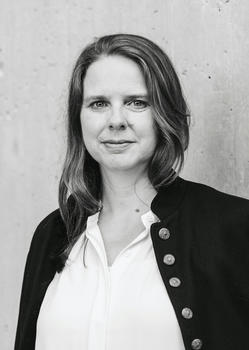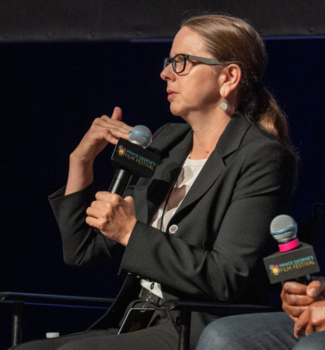In This Story
Rebekah Wingert-Jabi grew up in Reston, Virginia, a place built on the belief that dignity, connection, and community could stand at the center of progress. That vision, established by the town's founder Robert Simon, was not just an idea Wingert-Jabi grew up hearing about. It was a value system she carried with her into the world.
It shaped how she listened to stories. How she learned to see beyond borders. And how she built a filmmaking career that has taken her across the globe—capturing voices of resilience, documenting movements for change, and using the camera not just as a creative tool but as a bridge between people.
"The more I listened to stories, the more I learned," she says. "I realized how powerful storytelling can be for understanding, empathy, and change."

After earning a degree in Asian Studies and a minor in production, Wingert-Jabi pursued filmmaking not by following a conventional industry path but by embedding herself in the communities whose stories she wanted to tell. From filming internal migration in China to documenting health and displacement issues in the West Bank, her work grew out of a deep commitment to experiential learning and understanding by living within, not apart from, the realities she captured.
Her work eventually led to international acclaim. Her work eventually led to international acclaim, with her films screening at prestigious festivals including the Tribeca Film Festival, DOCNYC, IDFA, and the Dubai International Film Festival, as well as being broadcast on PBS and Al Jazeera and distributed online by The Guardian. My Neighbourhood, a documentary chronicling a Palestinian-Israeli movement against evictions in Jerusalem, earned the prestigious George Foster Peabody Award. Produced with limited resources but extraordinary collaboration, the film demonstrated what Wingert-Jabi has long believed: powerful storytelling doesn’t require elaborate budgets. It requires vision, authenticity, and a willingness to listen.
"You can work with what you have and find the power in your characters and your stories," she says. "That's foundational to everything."
Despite the success, Wingert-Jabi's focus never shifted toward prestige or industry validation. Her goal remained the same—to amplify unheard voices and to use film as a force for understanding.
Today, that mission continues at George Mason University. Returning to Northern Virginia, Wingert-Jabi brings her international experience, community-rooted philosophy, and unwavering belief in film's power to George Mason's Film and Video Studies program.
Teaching courses like Video Production for Social Change, she challenges students to think beyond technical perfection and to engage deeply with the stories around them. Through real-world partnerships with local nonprofits, students create films that address real community needs, learning how to navigate collaboration, resource limitations, and the ethical responsibilities of storytelling.

Wingert-Jabi also emphasizes that powerful filmmaking is as much about resilience and listening as it is about craft. She encourages students to stay open to the unexpected, to adapt when projects don't unfold perfectly, and to approach every story with humility and care. In her classes, building strong technical skills goes hand in hand with cultivating the mindset needed to tell stories responsibly and powerfully.
"Equipment is part of the picture," Wingert-Jabi says. "But the foundation is the power of story and the power of character."
Students often find themselves transformed by the process. Wingert-Jabi recalls one project about affordable housing where a student, drawing from personal experience with housing insecurity, forged an immediate and profound connection with the people being filmed. For Wingert-Jabi, moments like that capture the heart of what filmmaking and teaching can do.
"Film doesn't always offer a clear or easy career path," she says. "But it offers extraordinary opportunities—for self-expression, for connection, and for understanding the world in a deeper way."
In a field often associated with chasing industry recognition or blockbuster success, Wingert-Jabi models a different path: one rooted in collaboration, authenticity, and a belief in storytelling's ability to expand empathy and build stronger communities.
At George Mason, students aren't just learning how to make films under her guidance. They're learning how to make an impact—whether across the globe or in their own neighborhoods. In doing so, they carry forward a tradition that Wingert-Jabi has lived her entire career: using stories to reflect the world and help shape it.
